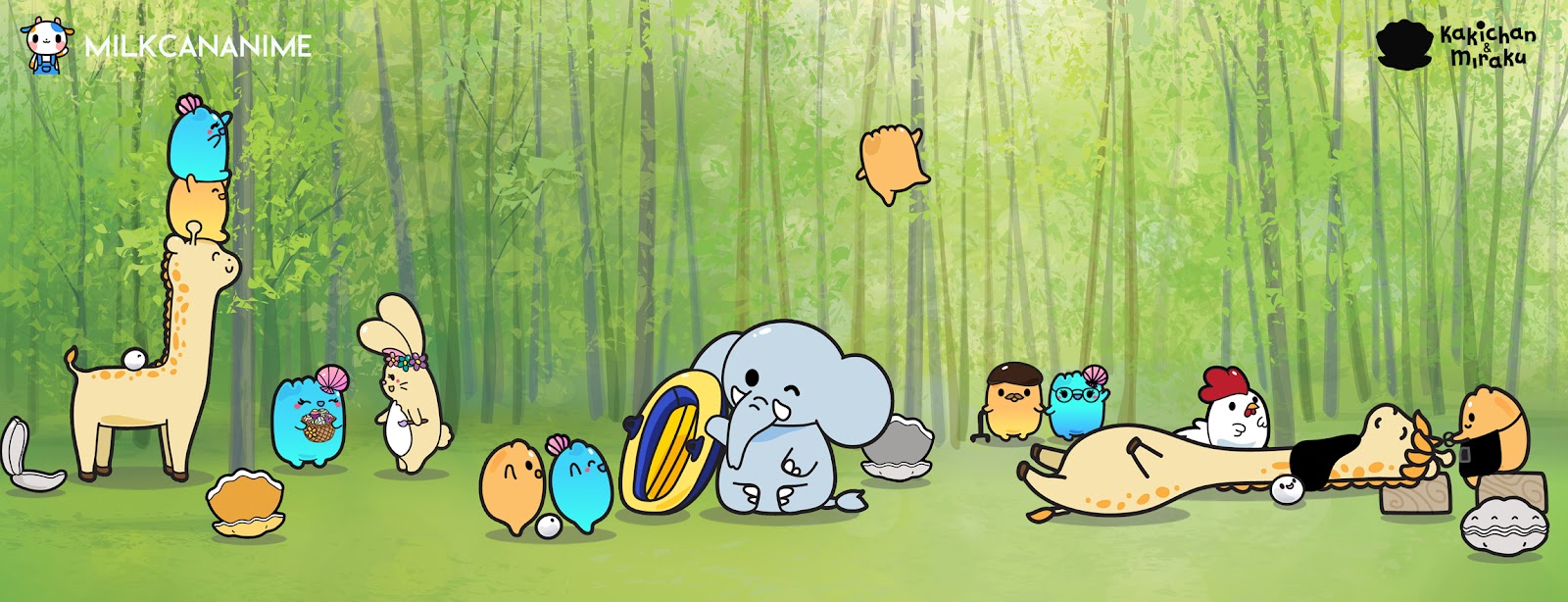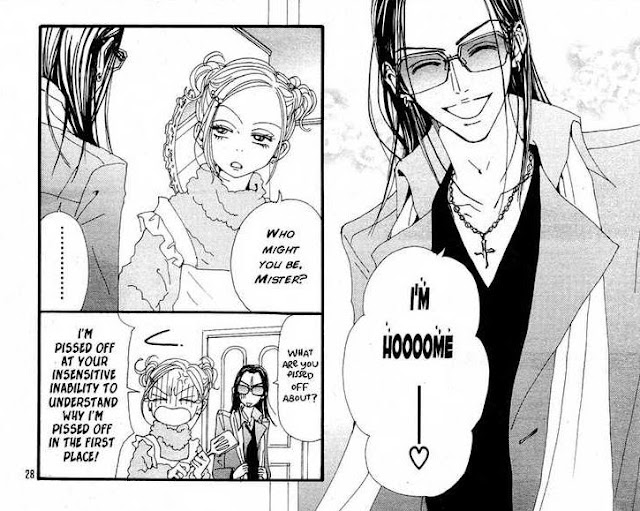Love Kills – Nana Manga Review
By chance, I came across a song called All I Want by Stonefox while
writing this review. The lyrics uncannily narrate the two main characters’
relationship and one of the sentences even exactly describes an actual scene
from the manga.
Sometimes when the sun
sets I feel alone
Sometimes I feel at home
This time, tonight, I need someone
And it's not the sand in my hair
It's the thoughts running through my head
All those things you never said
I'm on the last train home
And you call my phone
To say I love you is too strong
But you are all I want
When the sight of the ocean isn't enough
And the pressure on your lungs is just too much
Think of what you've got
And it's not the salt on your skin
It's me, I'm tired of running
You jump in but I won't swim
And I can't save you
Sometimes I feel at home
This time, tonight, I need someone
And it's not the sand in my hair
It's the thoughts running through my head
All those things you never said
I'm on the last train home
And you call my phone
To say I love you is too strong
But you are all I want
When the sight of the ocean isn't enough
And the pressure on your lungs is just too much
Think of what you've got
And it's not the salt on your skin
It's me, I'm tired of running
You jump in but I won't swim
And I can't save you
I tried reading Nana once before and could barely get
through the first chapter. I didn't like the art style at first. The tall,
gangly limbs, sharp chins, melon eyes and marker-thin eyebrows totally put me
off, along with the cluttered, fast-paced dialogue that sprouted across the
panels in wordy speech bubbles. Throw in my apprehension for hetero romances
(Yep, I don't typically enjoy reading about straight couples. But let’s save
that story for another time) and those were reasons enough for me to avoid Nana
completely. Still, that didn't stop me from continuing to come across praise
after praise for it. So I decided to give it another try.
With a little research, I also (unfortunately) found out that
the manga is on hiatus. No official announcement for its return has been made but I
heard that the mangaka hasn't been able to work on it ever since her injury a few years ago. She has, however, released (very) occasional Nana-related artwork after that. Frankly, this
made me want to immediately give it up. What if I got super attached to the
story??? And my gut feeling was right. Nana grew on me with such ferocious intensity
that I ended up being pleasantly surprised. If someone like me, who doesn't
even usually like this sort of plot and this particular art style, can end up being
impressed by Nana this much, I believe that almost anyone can enjoy it no
matter what genre they're into.
Nana tells the story of two girls who share the same name
and how their lives are joined by fate, starting from a coincidental meeting on
a train to Tokyo. One is a charismatic, somewhat androgynous punk rock singer.
She is headstrong, independent, snarky, values personal space and is a staunch realist.
The other is a cutesy, ditzy and materialistic doll-faced girl who is extremely
accepting and a total idealist. Even though they are so different in their
looks, personalities and beliefs, they end up becoming roommates, and
subsequently, the best of friends. And so begins the tale of the weird duo – Nana,
a charming and enigmatic figure, and Hachi, aptly nicknamed for her
love-starved puppy-like, but wholly endearing, temperament.
The strength of their relationship is founded on their
admiration for one another. They each have inspiring qualities that the other
doesn’t. Their friendship is bright and overwhelming because of how much they genuinely
love each other. Though the signs all point to them being more than just close
pals, there is nothing sexual or romantic about it. Their bond is above that of
rapport or romance; it is something much, much more. They are, quite simply,
soulmates.
In Nana, things don't turn out the way you want them to.
You'll feel frustrated by the situations and the characters. Hachi is cloying
and fickle to the point of hurting the people most important to her, Shouji is
unfaithful and cowardly, Takumi is insensitive, and the list goes on and on. But
it's hard to hate or blame them because the way they act and feel is so real.
Being human, we understand everybody has their own flaws - some of which cannot
be changed. Sometimes, the only option we have is to run away, instead of
trying to make things right. Nana shows these toxic aspects of human character
without restrain.
Love is complicated. Is it wrong to fall in love with two
people at the same time? Why do we love those who don’t love us back? Is it
possible to measure love? Nana poses unanswerable questions like these in its vivid,
moving and pensive storyline. Hachi, in particular, is a tragic character who
bears failed relationships time after time that were already destined to end unhappily
from the beginning. She is a sad, but very real, example of how some people can
only live their lives chasing after those who are bad for them.
Like I mentioned in my other review, I love it when
characters show hidden aspects of themselves, and are not what they seem on the
surface. The more obvious example would be Nana. She seems like a grounded girl
who has got everything together, but her spirited vivacity and sharp tongue
hide a wealth of turmoil and insecurities. When she's happy, she's extremely
happy. But when she's sad, she falls into deep despair. Initially, she seems
like one of the strongest characters when in reality, she's one of the most
vulnerable. She is proud and wilful, and in a sad twist of irony, this is what
destroys her.
Another example of a complex, albeit much more subtle, character
is Takumi. It's easy to pin him as the bad guy with his casanova ways and
emotional detachment. However, as the story progresses, we not only learn the
motives behind his unsavoury behaviour, but also admirable aspects of his
personality – such as his noble perception of love and what it means to be
responsible to his family. In a sense, Hachi and him are rather similiar in
terms of their self-sacrificial endeavours. Hachi is dangerously selfless for
the ones she loves; she feels the pain of others as her own, while Takumi gave
up his soul for work and to preserve the things important to him. He is someone who undergoes gradual and major
character development.
I enjoyed Nana for its cast and drama. It is a wonderful
story of human relationships and just life in general. But you know what's
another awesome thing about this manga? The smexy dudes. ( ͡° ͜ʖ ͡°) Damn are
they fine as hell or what?! Especially Yasu like oh my goodness. I'll eat that
booty like groceries. By the way, I looked up the actor who played him in the
film adaptation. Let's just say I was disappointed.
Be still, my fujoshi heart.
Yeah... I kinda love Yasu.
To sum it up...
Plot: 8/10 – Basic premise that risked being
shallow or corny, but is elevated with its intelligence and melancholic wisdom.
Humour is on point too. Something I wasn’t sure if I liked or not was the
constant scene-flashing from the future, which began happening during the later
bulk of the chapters. While it creates tension and a sense of foreboding over
the current events, it forces the reader into this fixed perspective and kind
of ‘spoils’ the progression of the story because you have the basic gist of how
everything ends. (Of course, now that I am aware the manga may never be continued, I am eternally grateful for these parts.)
Art: 7/10 – It’s really a case of personal
preference. I’m still not a die-hard fan of the art, but it’s nicely drawn overall and
the characters’ expressions are fantastic.
Characters: 8.5/10 – The cast is interesting and multi-dimensional.
They all have their fair share of likeable and unlikeable qualities. I like how
their stories and backgrounds are slowly revealed and strategically placed so
as to not be insignificant or forgettable.
Personal enjoyment: 8.5/10
Overall rating: 8/10 – It’s a real pity that
this manga might never have proper closure. It gets cut off at a point that can only be described as the beginning of a second story. Still, despite this glaring
fault, I feel that Nana is special and just barely worth the pain. Give it a go
and cherish every chapter. I’ll just go ahead and lie down and think up of a
zillion different endings while tears stream down my face.

Note: This review was written at the time when 84 chapters had been released.










































No Comment to " Love Kills – Nana Manga Review "